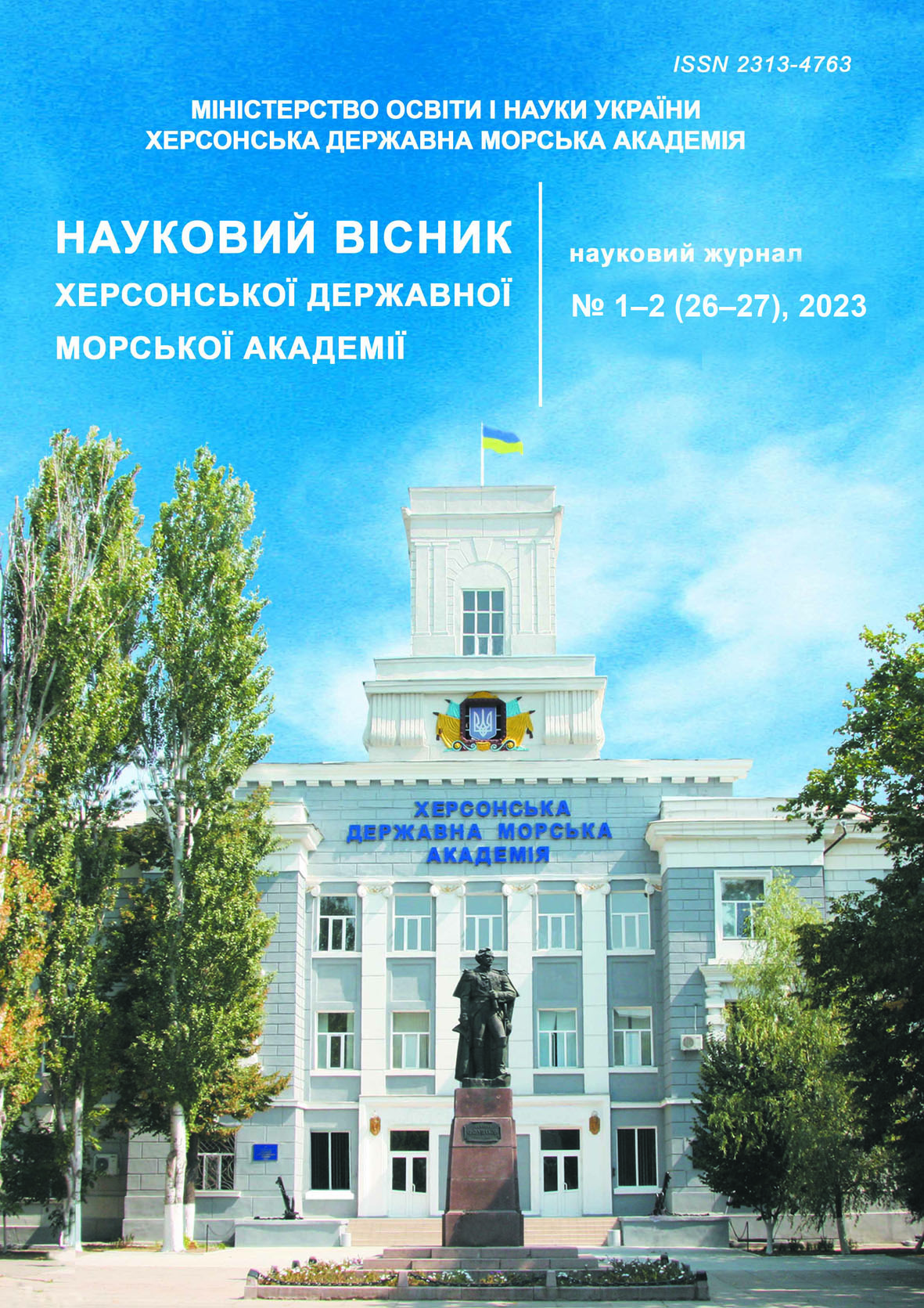METHOD OF THE SHIP MAIN ENGINE CONDITION OPERATIONAL DIAGNOSTICS
https://doi.org/10.33815/2313-4763.2023.1-2.26-27.133-143
Abstract
The article is devoted to solving the problem of improving the quality of operational diagnostics of the ship main engine in real time. Modern technical diagnostic systems must perform quick and high-quality identification of increasing malfunctions for the most effective use of monitoring results when solving operational tasks with the issuance of recommendations, which will allow expanding the competence of technical personnel in the decision-making process. Therefore, an important task is the development of mathematical models of time series of measured values of controlled parameters, which will allow to improve the procedure of operational diagnostics due to the detection of the probability of failure of ship engine units before the area of the most intense wear or destruction. In order to improve the existing methods of technical diagnostics of technological equipment, effective operational diagnostics algorithms have been developed, which are implemented in software modules and fully take into account technical and economic requirements, stochastic nature of external influences. When building the operational diagnostics algorithms, the specifics of the processes taking place in the ship main engine were taken into account, modern techniques and methods of mathematical modeling and information theory were used. On the basis of the values obtained as a result of measurements of the controlled parameters of the ship main engine, autoregressive models of the moving average were selected, which describe the obtained time series as accurately as possible. The parameters of the autoregression models were identified using the method of least squares. A method of operational diagnostics based on the determination of spectral entropy and the procedure of logical-time processing is proposed. On the basis of the developed mathematical models and the proposed diagnostic method, an automated system of operational diagnostics of the state of the ship main engine has been developed, which allows timely detection of critical modes of operation of technological equipment in real time.
References
Young-Jin Kang, Yoojeong Noh, Min-Sung Jang, Sunyoung Park, Ju-Tae Kim (2023). Hierarchical level fault detection and diagnosis of ship engine systems. Expert Systems with Applications, Volume 213, Part A, 2023. https://doi.org/10.1016/j.eswa.2022.118814.
Charchalis, A. (2011). Diagnostics of vessel power plants. Journal of KONES, 2011, 18(2), 41–47.
Christian Velasco-Gallego, Iraklis Lazakis (2022). RADIS: A real-time anomaly detection intelligent system for fault diagnosis of marine machinery. Expert Systems with Applications, Volume 204, 2022, https://doi.org/10.1016/j.eswa.2022.117634.
Daya, A. A., & Lazakis, I. (2022, April). A semi automated model for improving naval vessel system reliability and maintenance data management. In RINA Autonomous Ships conference 2022 (pp. 1–12).
Engine monitoring systems – Kongsberg Maritime. https://u.to/fpgJIA.
MAN Energy Solutions SaCoS 5000 engine control system. https://u.to/S5oJIA.
Engine Control System Refit – Praxis Automation Technology. https://u.to/S88JIA.
Products and solutions for marine applications – Wärtsilä. https://www.wartsila.com/.
Makridakis, S., Spiliotis, E., Assimakopoulos, V. (2018). Statistical and Machine Learning forecasting methods: Concerns and ways forward. PLoS ONE, 13(3). https://doi.org/10.1371/journal.pone.0194889.
Kondratieva, I. U., Rudakova, H. V. and Polyvoda, O. V., (2018). "Using Acoustic Methods for Monitoring the Operating Modes of the Electric Drive in Mobile Objects," 2018 IEEE 5th International Conference on Methods and Systems of Navigation and Motion Control (MSNMC), Kiev, Ukraine, 2018, pp. 218–221. https://doi.org/10.1109/MSNMC.2018.8576296.
Polyvoda O., Rudakova H., Kondratieva I., Rozov Y., Lebedenko Y. (2019). Digital Acoustic Signal Processing Methods for Diagnosing Electromechanical Systems. In: Lecture Notes in Computational Intelligence and Decision Making. ISDMCI 2019. Advances in Intelligent Systems and Computing, vol 1020. Springer, Cham, pp 97–109. https://doi.org/10.1007/978-3-030-26474-1_7.
Kondratieva, I. U., Rudakova, H. V., Polyvoda, O. V., Lebedenko, Yu. O., Polyvoda, V. V. (2019). Using entropy estimation to detect moving objects. 2019 IEEE 5th International Conference Actual Problems of Unmanned Aerial Vehicles Development, October 22–24, 2019, Kyiv, Ukraine Proceedings, P. 270–273. https://doi.org/10.1109/APUAVD47061. 2019.8943839.
Rudakova, H., Polyvoda, O., Kondratieva, I., Polyvoda, V., Rudakova, A., Rozov, Y. (2022). Research of Acoustic Signals Digital Processing Methods Application Efficiency for the Electromechanical System Functional Diagnostics. In: Lecture Notes in Computational Intelligence and Decision Making. ISDMCI 2021. Lecture Notes on Data Engineering and Communications Technologies, vol 77. pp 349-366. Springer, Cham. https://doi.org/10.1007/978-3-030-82014-5_23.
Lenard, B., Pershey, E., Nault, Z., Rasin, A. (2023). An Approach for Efficient Processing of Machine Operational Data. In: Database and Expert Systems Applications. DEXA 2023. Lecture Notes in Computer Science, vol 14146. Springer, Cham. https://doi.org/10.1007/978-3-031-39847-6_9.
Pająk, M., Kluczyk, M., Muślewski, Ł., Lisjak, D., Kolar, D. (2023). Ship Diesel Engine Fault Diagnosis Using Data Science and SVM Classifier. In: Advances in Technical Diagnostics II. ICTD 2022. Applied Condition Monitoring, vol 21. Springer, Cham. https://doi.org/10.1007/978-3-031-31719-4_1.






